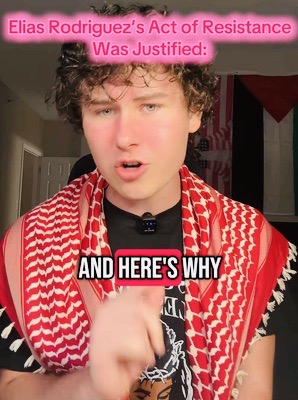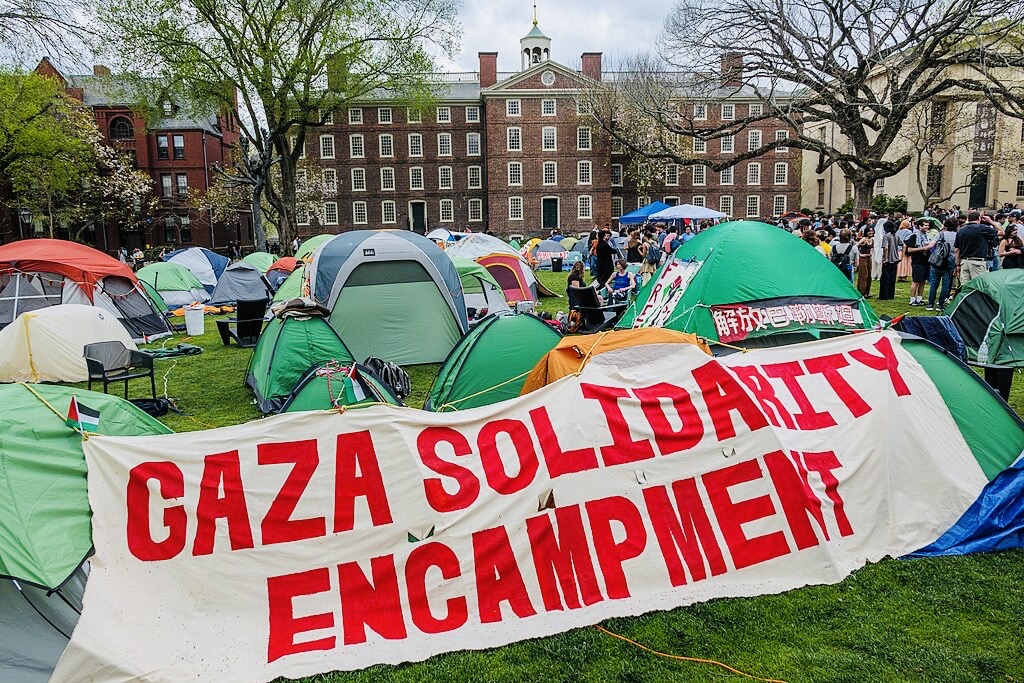The killing of two Israeli embassy staffers outside the Capitol Jewish Museum in Washington, D.C. last week has focused renewed attention on the pro-Palestinian movement in the United States.
Yaron Lischinsky, 30, and Sarah Lynn Milgrim, 26, who were engaged to be married, were fatally shot by Elias Rodriquez, a 31-year-old anti-Israel activist from Chicago. He shouted “Free, free Palestine” before admitting he was the assailant.
Rodriquez, who has been charged with first degree murder, supposedly did not know the victims, who were attending a conference sponsored by the American Jewish Committee.
What seems to have mattered to him was that they were Jewish.
The antisemitic nature of his crime brought into relief a troubling issue at the core of the pro-Palestinian movement, which burst into prominence after Hamas’ massive attack against Israel on October 7, 2023.
Since then, the movement has expressed itself through anti-Israel protests on university campuses and, until last year, through the construction of makeshift encampments at universities.
These manifestations of hatred toward Israel have unsettled and intimidated many Jewish students, some of whom felt they had crossed the line into outright antisemitism.
The movement’s supporters, who tend to be left-wingers and progressives apart from ethnic Palestinians, claim that criticism of Israel should not be conflated with animus toward Jews.
Two points should be made about this argument.
First, the vast majority of pro-Palestinian protesters have abandoned the two-state solution and now call for a single binational state to replace Israel. Obviously, a preponderance of Israeli Jews and Jews in the Diaspora categorically reject such an outcome, which would be a victory for Hamas and its patron, Iran.
Second, Rodriquez deliberately targeted an event attended primarily by Jews. When he opened fire on Lischinsky and Milgrim, he most probably assumed they were Jewish. In his mind, Israeli Jews and Jews outside Israel are one and the same. All Jews, whether in Tel Aviv or Toronto, are complicit in Israel’s alleged crimes against the Palestinians. Or so Rodriques thinks.
His murderous rampage raises a related issue — the degree to which pro-Palestinian Americans regard violence as a tool to combat Israel and its supporters.
Some protesters hew to a non-violent approach, supporting civil disobedience tactics perfected during the U.S. civil rights movement in the 1950s and 1960s. In the past decade or so, they have latched on to the Boycott, Divestment and Sanctions movement, whose overriding goal is to isolate and cripple Israel economically, while giving the Palestinians a shot at statehood.
Radicals in the pro-Palestinian camp endorse violence and armed resistance, in keeping with principles set out by the Palestine Liberation Organization nearly 50 years ago.
This sharp dichotomy surfaced following the deaths of Lischinsky and Milgrim, who were separately laid to rest in Israel and the United States in private funerals.
Sandra Tamari, the executive director of the pro Palestinian Adalah Justice Project, denounced their murders. “We hope and caution against this vigilante violence being used to undermine the movement to end the genocide, a movement of hundreds of thousands of Americans calling for ceasefire and arms embargo,” she said.
Layla Elabed, the leader of the Uncommitted National Movement, which objects to the U.S.’ alliance with Israel, lashed out at Rodriquez, saying his attack “betrays our values.”
The Council on American-Islamic Relations, the largest Muslim advocacy organization in the United States, denounced the incident as “completely unacceptable” and lamented that it “only undermines the pursuit of justice.”
Jewish Voice For Peace, an anti-Zionist group, issued a similar statement, saying it is committed to the belief that “all human life is precious.”
These voices were drowned out by activists who reject non-violence.

Guy Christensen, a TikTok influencer with more than three million followers, said, “I do not condemn the elimination of the Zionist officials who worked at the Israeli embassy. I want to urge you first to support Elias’ actions. He is not a terrorist. He’s a resistance fighter, and the fact is that the fight against Israel’s war machine, against their genocide machine, against their criminality, includes their foreign diplomats in this country.”
Susan Abulhawa, the director of the Palestine Writes festival at the University of Pennsylvania in 2023, branded Lischinsky and Milgrim as “genocide cheerleaders” in a series of tweets. She expressed surprise that bloodshed had not been spilled sooner.
Unity of Fields, formerly Palestine Action U.S., tacitly supported Rodriques, comparing him to Luigi Mangione, who is accused of assassinating a health insurance executive in New York City last year.
Unity of Fields describes itself as a far-left “anti-imperialist propaganda front for the international cradle of resistance.” Its stated mission is to disrupt and dismantle “Zionism and American imperialism” through “militant direct actions.”
According to the Anti-Defamation League, Unity of Fields has endorsed and publicized acts of vandalism against synagogues and Jewish-owned businesses.
It hailed the October 7 massacre and explicitly supports the Popular Front for the Liberation Palestine, Ansar Allah (the Houthis in Yemen), Hezbollah and Hamas.
The Resistance News Network, an anti-Zionist English-language Telegram channel with about 130,000 subscribers, promotes violence against Israel and its allies.
However one perceives Rodriques and Americans like him, his shooting spree highlighted the strain of violence and antisemitism in the pro-Palestinian movement.
The Heritage Foundation, a conservative think tank in Washington, seeks to crush it through Project Esther, which was established shortly after October 7.
Project Esther regards the movement as a terrorist support network that disseminates antisemitism. Its goals are clear. Students on campuses who support it should be expelled, or deported if they are citizens of foreign countries. “Supporting faculty” should be fired. Universities that tolerate pro-Palestinian activity should lose federal government funding. Politicians aligned with it, such as Bernie Sanders and Elizabeth Warren, should be watched.

Judging by U.S. President Donald Trump’s decision to deprive Harvard University of federal funding, his administration appears to have adopted some of Project Esther’s recommendations.
This past January, the Trump administration issued an executive order to marshal federal resources “to combat the explosion of antisemitism on our campuses and in our streets since October 7, 2023.” The order accepts the International Holocaust Remembrance Alliance definition of antisemitism as “targeting” Israel as a racist state.
Three months ago, the Department of Justice announced the formation of a task force to “root out antisemitic harassment in schools and on college campuses.”
At the same time, Attorney General Pam Bondi established an additional task force to investigate threats posed by Hamas and “antisemitic acts of terrorism and civil rights violations in the homeland.”
The Trump administration also announced the launch of related investigations into five American universities over their handling of “widespread antisemitic harassment.”
To critics, Trump is weaponizing antisemitism to clear universities of woke ideology.
Trump’s campaign is not entirely original.
His predecessor, Joe Biden, condemned pro-Palestinian student demonstrations at Columbia University as “blatant antisemitism.” His condemnation emboldened the U.S. Congress to start investigations into the Palestinian protest movement.
Trump’s declaration of war against pro-Palestinian students and organizations has damaged the movement. But perhaps the hardest blow it has sustained so far has come from one of their own.
His name is Elias Rodriquez.
